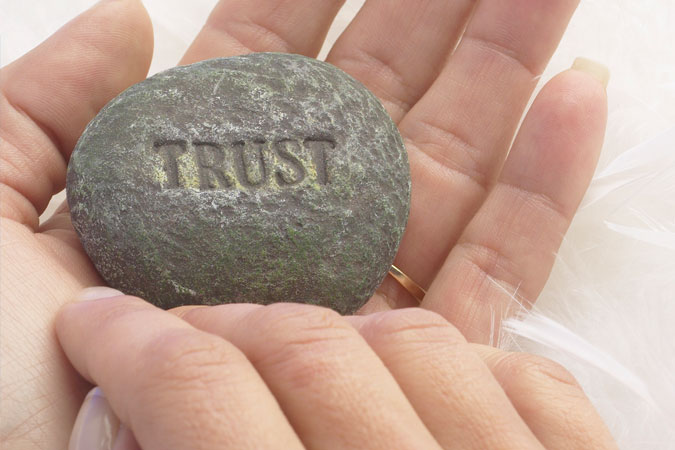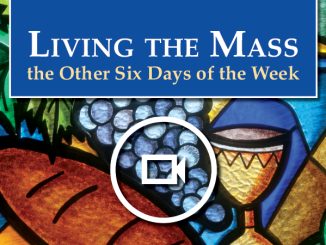
One of the key phrases in our current conversations about evangelization and discipleship is what Pope Francis has described as the art of accompaniment. To accompany someone is to walk along with that person on his or her journey. It is important to recognize, however, that a prerequisite to accompaniment is trust! If someone is going to allow us to walk with him or her on the journey, that person needs to know, first and foremost, if we are trustworthy, credible, and reliable. Many experts in leadership emphasize that one of the first priorities of an effective leader is to establish a climate of trust. In other words, people need to know that they are safe in the environment that they are being invited into. This is especially crucial in a faith formation/spiritual environment where people are being invited to entrust their entire being to the Person of Jesus Christ and his Church. In order for us to effectively evangelize and catechize those entrusted to us, we need to establish trust.
In a much-viewed TED talk, “Why Good Leaders Make You Feel Safe,” management theorist Simon Sinek emphasizes that effective leaders draw their people into a circle of trust—a place where they feel safe from the dangers surrounding them, but also empowered to battle those forces of danger. In that talk, Sinek says, “You know, in the military, they give medals for people who are willing to sacrifice themselves so that others may gain. In business, we give bonuses to people who sacrifice others so that we may gain. We have it backwards.” How true. Sinek goes on to say that, when people feel safe and secure and within a circle of trust, remarkable things can happen: “When we feel safe inside the organization, we will naturally combine our talents and our strengths and work tirelessly to face the dangers outside and seize the opportunities.”
What this means is that it is crucial that we, today’s catechists and evangelizers, can and must establish trust by doing the following:
- We must speak credibly. What we have to say must be sound and must resonate with all that is good, true, and beautiful.
- We must act reliably. Our actions must flow from and match our words; they must be an authentic embodiment of what we say.
- We must be approachable. Those we serve must feel comfortable and safe confiding in us.
- We must focus on others. Our attention must be on those we serve, not on ourselves.
How do we do this in practical terms? Here are some suggestions I’d like to offer.
- Clarify expected behaviors for all (including yourself). Trust is built when participants know what behaviors are encouraged and what behaviors are unacceptable. They should even be invited to construct this list or at least add to it. Participants can also benefit from hearing you, as the leader/facilitator of the group, identify which behaviors are required of you in order to ensure a safe environment.
- Consistently confront violations of such behaviors and affirm adherence. Trust is built when participants see that the aforementioned codes of conduct are enforced and that there are consequences or repercussions for violations of such codes of conduct.
- Encourage and protect expression. Trust is built when participants feel free to express themselves and know that, if and when they do, they will be respected and their contributions will be appreciated.
- Encourage and embrace candor. Trust is built when participants are allowed the freedom to grapple with concepts being presented and to respectfully express their disagreement with impunity.
- Encourage risk-taking and do not fear failure. Trust is built when participants know that they can use their unique gifts and talents to try new things and not fear repercussions simply for trying.
- Incorporate cooperative-learning opportunities. Trust is built when participants interact with one another in order to build trust in the group, not just between them and you, but between one another.
- Share responsibility. Trust is built when participants (especially older children, youth, and adults) enjoy a sense of ownership and shared responsibility for the direction of the group.
- Show compassion and empathy. Trust is built when participants know that you truly care about them and understand them.
- Celebrate diversity. Trust is built when participants know that their unique talents, gifts, characteristics, and identities are welcome and that they are not simply expected to conform or to perform tasks.
- Generously affirm. Trust is built when participants know that they and their contributions are held in esteem and are appreciated.
- Admit your own mistakes, shortcomings, and limitations. Trust is built when participants recognize your transparency and honesty, which, in turn, encourages them to be transparent.
- Be available. Trust is built when participants know that you are approachable and that they can confide in you.
- Respect and observe boundaries. While boundaries sound like something negative—a way of shutting others out—they are actually quite positive: a means of protecting that which is sacred. In the Old Testament, we learn that the Temple in Jerusalem—the focal point of God’s sacred presence among his people—had various boundaries that separated Gentiles, Jewish women, Jewish men, and the priests from the Ark of the Covenant, which “contained” God’s sacred presence. In the New Testament, Jesus replaced that Temple with the temple of his own body, and St. Paul taught that we are temples of the Holy Spirit. As a result, we are called to respect the sacredness of ourselves and one another. One of the ways we do this is by observing physical, emotional, and behavioral boundaries.
Doing the work of establishing trust is not an interruption in our evangelizing/catechizing efforts; it is a prerequisite to meaningful accompaniment. What are some of the ways that you establish trust in your faith formation environment?





Be the first to comment